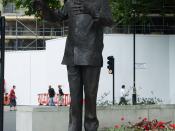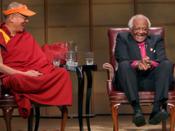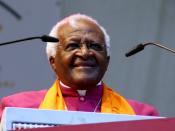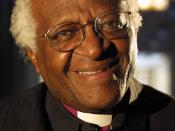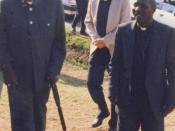Samantha Dzirko
Reverend Desmond Mpoli Tutu is a man who has worn and still wears many hats, but all with the same purpose - creating and nurturing peace. Tutu has been awarded many times for his works against apartheid. He is also a strong proponent of AIDs awareness. Tutu began life as a teacher and eventually became a clergyman when he could no longer bring himself to teach. As a clergyman, specifically, a priest, Tutu actively worked on improving the lives of black South Africans by working against apartheid and demanding that the government changes their policies. When Tutu's goal was accomplished and South Africa had removed its discriminatory laws, Tutu continued to work as the Archbishop of Cape Town and served as the chair of a council that reviewed the thirty-four years of injustice that black South Africans had suffered.
The awards that Tutu have received are the Nobel Peace Prize in 1984, the Alber Schweitzer Prize for Humanitarianism, Sydney Peace Prize, and the Magubela prize for liberty in 1986.
He has earned these awards because of his various humanitarian accomplishments, such as working against apartheid by demanding the end to the oppressive laws (i.e. the passport and relocation laws).
Originally, Tutu wanted to become a doctor, but his parents were not in the position financially to send him to medical school forcing Tutu to change his desired career path. He decided to follow in the footsteps of his father, who was a teacher. Tutu studied to become a teacher at the Pratoria Bantu Normal College and graduated from the University of South Africa in 1954. Because of apartheid, the South African government regulated that black South African students receive an inferior education to those of white South African students. Tutu would not hear of it and refused to cooperate with this decree meaning that once again Tutu had to change his career path. He was determined to help his people in any way that he could, even if he was no longer able to educate the children he once taught. At this point, Tutu's bishop suggested that he become a member of the clergy, specifically, go into priesthood.
In 1960, Tutu was ordained as a priest in the Anglican Church. After he was ordained, he studied in England and earned his master's degree in theology. With this degree, he taught theology in South Africa for approximately five years. In 1975, Tutu returned to England in order to serve as an assistant director of the World Council of Churches in London. In the same year, Tutu served as the Dean of St. Mary's Cathedral in Johannesburg. He was the first black to do so. In 1986, Tutu became the first black Archbishop of Cape Town. He continued to work as a member of the clergy 1994 when President Nelson Mandela appointed Tutu to chair the Truth and Reconciliation Commission whose purpose was to investigate the past injustices and lack of human rights that had been occurring for the past thirty-four years. Today, Tutu can be found at the Emory University in Atlanta Georgia where he has worked since he retired as Archbishop of Cape Town in 1996.
Reverend Desmond Mpoli Tutu desired to improve the lives of those around him as is apparent in his career choices. Tutu originally wanted to be a doctor, but was unable to and so he decided to go into education, but the South African laws regulating a lesser education to black South African children made Tutu unable to continue his job. Therefore, after persuasion from his bishop, Tutu entered priesthood, where he moved up the ranks of the Anglican Church and eventually earned the title of Archbishop Emeritus.
